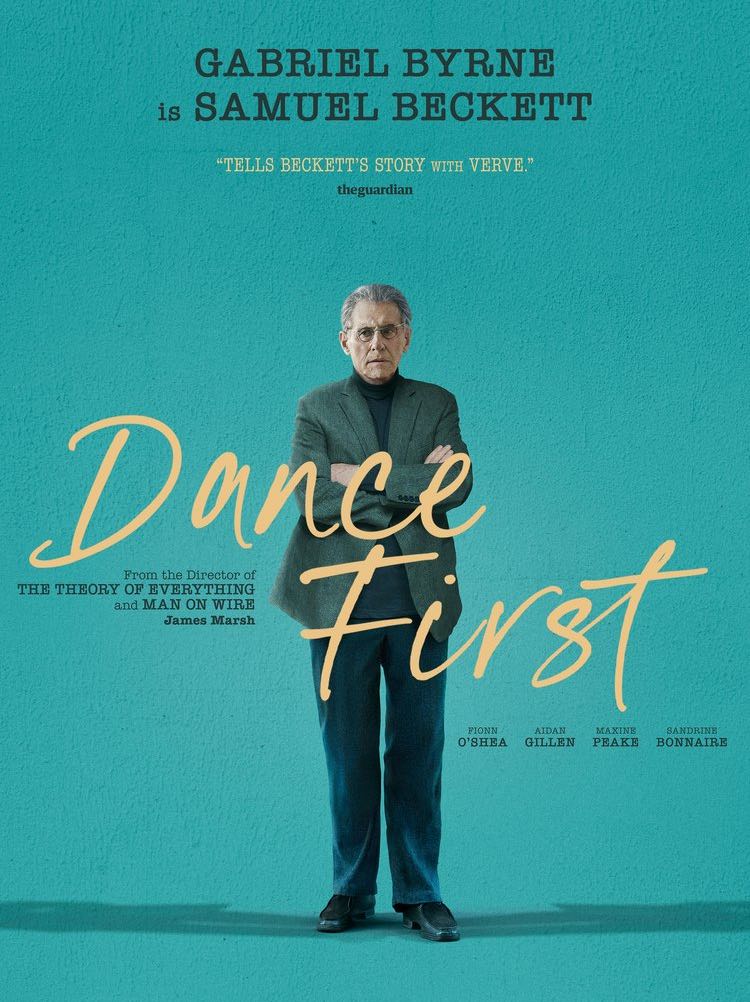Dance First is a sympathetic yet honest film about playwright and author Samuel Beckett. Written by Neil Forsyth and directed by James Marsh, it follows Beckett from his childhood to his final years, although it explores more of his personal life than the plays and books that made him famous.
Gabriel Byrne plays the older Beckett with self-deprecation and recrimination. After being told Waiting for Godot is a masterpiece, he replies, “God, I hope not.” At the movie’s start, with Beckett winning the Nobel Prize for literature, he turns to his wife Suzanne (Sandrine Bonnaire) and whispers, “What a catastrophe.” Returning to the flat he shares with Suzanne after a business trip and affair, he sighs deeply, and Suzanne understands from his face what he has done.

Much of the movie follows Beckett looking back at his life on the people (mostly women) he feels he betrayed, while trying to decide where to donate the Nobel Prize. In remembering, Beckett talks with another version of himself, also played by Byrne. This inner Beckett tries to assuage his guilt, reminding him of other people’s responsibilities and roles in suffering. Talking about his guilt in World War II, he asks, “You’re not going to take the blame for the whole war, are you?” He still helps present these painful memories, even ruthlessly saying “no” to a request Beckett makes.
Sandrine Bonnaire gives Beckett’s wife Suzanne a quiet fierceness, as does Leonie Lojkine as the younger Suzanne. Believing in his work, she serves as his protector, reminding him before a business meeting that he “must continue to write in French. That way we get paid twice” for the English translation. Beckett’s eventual success disturbs her, for, she says, “We were meant to struggle.” Later, she criticizes him on his shopping and his ongoing relationship with Barbara Bray (Maxine Peake).
Maxine Peake brings a warmth and wit to Barbara Bray, a BBC publicist and Beckett’s longtime lover. Reading a play depicting the triangle between her, Beckett, and Suzanne, she offers to review it. When Beckett has doubts that he can continue writing and regrets “dragging you [Bray] into this,” she comforts him, loving their working relationship. About to move away, she lies down with Beckett on the floor of her now-empty flat, and they hold each other.
Fionn O’Shea is filled with deep, melancholic thoughts as young Beckett. He speaks softly yet firmly, whether against his mother’s hatred of his writing or refusing an engagement imposed on him. As a resistance operative during World War II, he calmly phones contacts with coded instructions while he and Suzanne hastily prepare to escape, the Gestapo raiding the building next door.
Aiden Gillen brings a quiet forcefulness to James Joyce. He jokes with Beckett after the younger man tries to speak Irish to him, reminding him that “I do not speak Irish, and I suspect neither do you.” Bronagh Gallagher gives a determination to Nora, Joyce’s wife, interrupting literary conversations with cuttingly humorous tales of her courtship by Joyce. She blackmails Beckett into continuing a relationship he does not want to pursue. Grainne Good is full of energy and motion as Joyce’s daughter Lucia, always dancing, singing, and swaying. She makes a fun contrast with O’Shea, who is quiet and awkward at dancing. Supposedly “mad,” she comes across more as youthful and vibrant, especially surrounded by sedate intellectuals. She seems to embody the movie’s title, which comes from advice Beckett gave to a young writer: “Dance first, think later.”
Apart from one early scene, screenwriter Neil Forsyth and director James Marsh present Beckett’s life straightforwardly, which feels surprising given Beckett’s unconventional works. Perhaps it is necessary to keep the audience following the action. And while the movie gives nice details on Beckett’s personal life, probably unfamiliar to many viewers and so requiring no prior knowledge, there is only one brief look at one of his plays. As it runs a little over an hour and a half, seeing so little of Beckett’s work feels like a lost opportunity. Still, it moves quickly and easily, with both black humor and thoughtful reflection about a complex man.
Running Time: One hour and 45 minutes.
Dance First, a Magnolia Pictures film, is available to watch at home on Amazon Prime and other streaming platforms.
